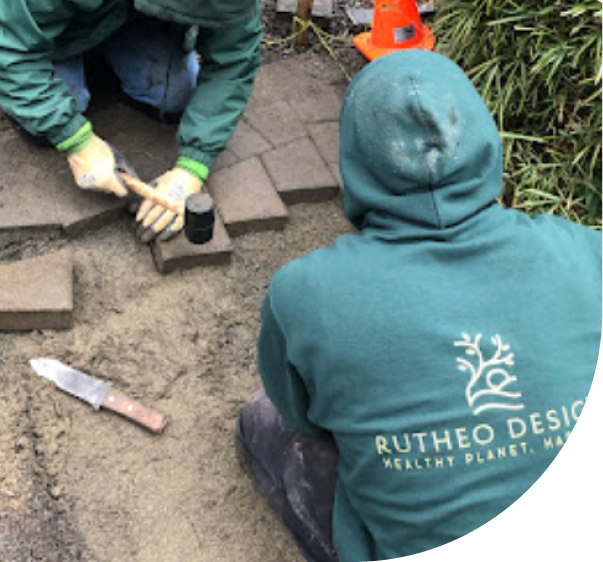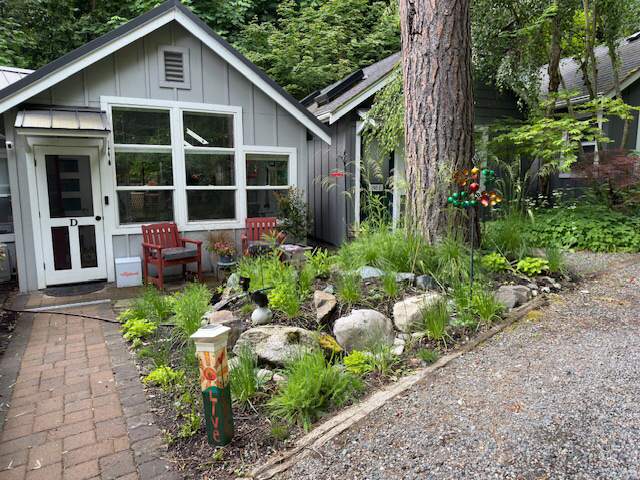
At Rutheo Designs, we believe that selecting the right fruit trees is the cornerstone of a thriving, sustainable landscape in Seattle. Our region’s unique climate, characterized by mild, wet winters and dry summers, offers both opportunities and challenges for fruit tree cultivation. It’s essential to consider factors such as microclimates, chill hour requirements, and disease resistance when choosing varieties that will flourish in the Pacific Northwest. Whether it’s disease-resistant apple trees, hardy pear varieties, or figs suited for Seattle’s milder microclimates, we focus on selecting species that not only yield abundant harvests but also integrate seamlessly into diverse landscape designs. By incorporating edible landscaping, we create functional, beautiful outdoor spaces where fruit trees enhance biodiversity while providing fresh, homegrown produce. Our approach ensures that every tree contributes to a resilient, eco-friendly environment while enhancing the aesthetic appeal of your outdoor space.
Seattle’s diverse microclimates play a crucial role in fruit tree selection. Variations in temperature, rainfall, and exposure to coastal influences can significantly impact fruit production. Areas near the Puget Sound may experience milder winters and cooler summers, while inland regions may have more pronounced seasonal changes. Identifying frost pockets—low-lying areas where cold air settles—and wind exposure zones helps in selecting resilient tree varieties and determining optimal planting locations.
Selecting fruit trees suited for maritime climates means focusing on species that can tolerate wet conditions and fluctuating temperatures. Trees with strong disease resistance to fungal issues, common in damp environments, will perform better. Strategic site placement to maximize sunlight and protect against prevailing winds also enhances fruit quality and tree health.
Seattle’s climate is well-suited for a range of fruit trees, provided the right varieties are chosen:
Choosing the right fruit tree goes beyond taste preferences. Important factors include:
Seattle’s rainy climate demands well-draining soil to prevent root rot. Testing soil composition helps determine drainage capacity, pH levels, and nutrient availability. Fruit trees generally prefer slightly acidic to neutral pH (6.0-7.0).
Improving soil structure with organic amendments like compost, aged manure, and biochar enhances fertility and drainage. Incorporating mycorrhizal fungi at planting can support root development and nutrient uptake.
Despite Seattle’s cloudy reputation, fruit trees need ample sunlight—ideally 6-8 hours daily—for optimal growth. Position trees in south-facing areas when possible to maximize exposure.
Proper spacing ensures good air circulation, reducing the risk of fungal diseases. Plan for the mature size of the tree’s canopy to prevent overcrowding, which can hinder light penetration and airflow.
Fruit trees serve multifunctional roles in sustainable landscapes. They provide shade, act as windbreaks, and create privacy screens. Incorporating them into permaculture designs enhances ecological balance.
Companion planting with herbs (like comfrey or chives), nitrogen-fixing plants (such as clover), and pollinator-attracting flowers supports biodiversity and natural pest control, reducing reliance on chemical inputs.
Proper site preparation ensures healthy root establishment. Dig planting holes twice as wide as the root ball but no deeper to prevent settling. Incorporate organic matter into the backfill soil to promote moisture retention and nutrient availability.
Mycorrhizal inoculants and compost tea can boost microbial life around the roots, enhancing nutrient uptake and disease resistance. Mulching with organic materials like straw or wood chips helps retain moisture and suppress weeds.
Efficient water management is critical in Seattle’s variable climate. Drip irrigation systems deliver moisture directly to the root zone, minimizing waste and reducing fungal risks from wet foliage.
Integrating rainwater harvesting systems promotes sustainability and reduces dependence on municipal water. Adjust irrigation schedules based on seasonal rainfall to prevent overwatering, particularly during wet winters.
Maintaining soil health through organic practices ensures long-term productivity. Apply compost, aged manure, and organic fertilizers seasonally to replenish nutrients.
Cover crops like vetch or clover improve soil structure, enhance nitrogen levels, and prevent erosion. No-till practices preserve soil microbiology, supporting healthier root systems and reducing carbon emissions.

At Rutheo Designs, we are dedicated to transforming your outdoor spaces into beautiful, sustainable landscapes that reflect your vision and the unique character of the Seattle area. We offer services in native plant landscaping, water-efficient irrigation, custom landscape design, and hardscaping solutions tailored to your goals and the local environment. Every project is unique, and we take the time to listen to your needs and offer personalized solutions that align with both your aspirations and Seattle’s natural surroundings.
We invite you to reach out to us to start the conversation about your landscaping needs. You can contact us by email at connect@rutheodesigns.com or give us a call at (360) 844-2989. Whether you have specific questions or are ready to schedule a consultation, we’re eager to help you bring your outdoor vision to life with the care and expertise that Rutheo Designs is known for.